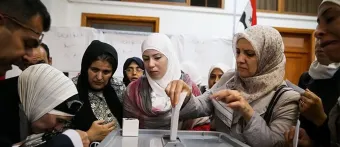Syrian People’s Council Elections 2020: The Regime’s Social Base Contracts

Syrian People’s Council Elections 2020: The Regime’s Social Base Contracts
Against the backdrop of an unprecedented economic crisis, the Syrian People’s Council elections were held in July 2020, following two postponements due to the COVID-19 pandemic. Although the electoral campaign slogans launched by the candidates – especially the independents – focused on economic concerns, and made reference to charitable contributions and propaganda from the candidates, the elections failed to capture the interest of the majority of constituencies in the territories controlled by the Bashar al-Assad regime.
As usual, the ruling Baath Party controls the majority of seats in the new Council. Certain marginal parties allied with the Baath are also represented within the so-called National Progressive Front (NPF), which is led by the Baath itself. Independents rank second in terms of seat numbers after the Baathists. However, partisan affiliations are of no significance in terms of stances vis-à-vis the regime, since loyalty is a non-negotiable prerequisite for all 250 MPs, and indeed all candidates.
Though the Baath Party retains an absolute majority of seats in parliament (66.8%), the elections demonstrated the inability of its leadership to revive the Party as an effective political tool capable of exercising influence by itself. First, the primaries for selecting Party candidates were marked by limited participation, accusations of corruption and widespread objections within the Party. Second, the parliamentary elections saw a historically low turnout (33%), illustrating the Party's inability to mobilise the electorate. Finally, attempts to renew the Baathist bloc in the People's Council resulted in the rise of military and paramilitary figures (with the entry into parliament of retired army and police officers); a growing influence of capital (with higher numbers of businessmen MPs); and the emergence of centres of power outside the traditional Party structure (with the entry of charity and development activists, backed by First Lady Asma al-Assad). This heterogeneity within the Baath’s parliamentary bloc illustrates the reality of the Party today, which appears weaker than it was before the outbreak of the revolution.
The views expressed are those of the authors alone and do not reflect those of the publisher.
Published in October 2020.
All rights reserved to the GCSP and EUI.
Part of the Syria Transition Challenges Project
Ziad Awad is a Syrian journalist and researcher who works under the aegis of the Wartime and Post-Conflict in Syria (WPCS) project in the Middle East Directions programme supervised by the Robert Schuman Centre for Advanced Studies at the European University Institute in Florence.
Agnès Favier is a Part-Time Professor at the Middle East Directions programme of the Robert Schuman Centre for Advanced Studies. She leads the Syria Initiative and is Project Director of the Wartime and Post-Conflict in Syria (WPCS) project.
